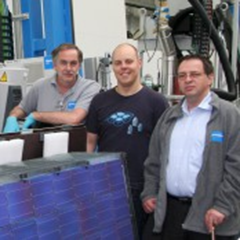Neuhausen-Hamberg (Germany), July 15, 2013. The official inauguration of the new laboratory building at the Fraunhofer Institute for Solar Energy Systems (ISE) in Freiburg took place at the beginning of July. Prior to this the first ten of an eventual 250 TPedge solar modules were put in place and now decorate the façade of the new building. The TPedge modules were and continue to be manufactured at Bystronic glass in Neuhausen-Hamberg. They are a joint development between Bystronic glass and Fraunhofer ISE on the basis of a Fraunhofer patent.
In January 2012 the TPedge modules measured in their full-format 1636 mm x 985 mm, passed the mechanical load test up to a force measuring 2400 N/m2 and the hail impact test with ball speeds of 23 m/s. “The integration into the façade aims at further developing and testing the TPedge technology”, Tobias Neff, Product Manager Solar at Bystronic glass, explains. During the inauguration he presented the Bystronic glass gift to Prof. Dr. Eicke R. Weber, Director of the Fraunhofer ISE in Freiburg. Bystronic glass congratulates ISE on the completion of new the building with an insulating glass unit which has an edge sealing similar to the one of the TPedge module.
Cost reductions in module production with TPedge
The wafer-based solar module can be produced much quicker and less expensively than standard wafer modules. The time and cost savings are a consequence of a simplified modular structure and a completely innovative production technology. The cell array is locally fixed between two glass plates. The utilisation of foils and the associated laminating are not necessary.
“The edge sealing of the TPedge module is carried out via the application of the thermoplastic material TPS® at 130°C, with an additional aluminium frame not even necessary”, Tobias Neff explains and reports: “The TPedge technology reduces the costs of the module production by 30 to 40 per cent – at an aspired cycle time of 45 seconds per module line. As a result, the overall costs of a PV module can – depending upon the cost proportion of the solar cells – be reduced by approximately 14 per cent.”
Innovative leap in module production
The production lines for TPedge modules can be designed in various expansion stages. In the serial production line, it is possible to manufacture a module in less than a minute – compared to the 16 minutes required for the usual standard procedure. The new production principle is inspired by the sealing technology used in insulating glass production. The development of the TPedge process for the production of modules with thermoplastic sealing on the glass edge represents a great innovative leap in module production.
Website:
www.ise.fraunhofer.de



























